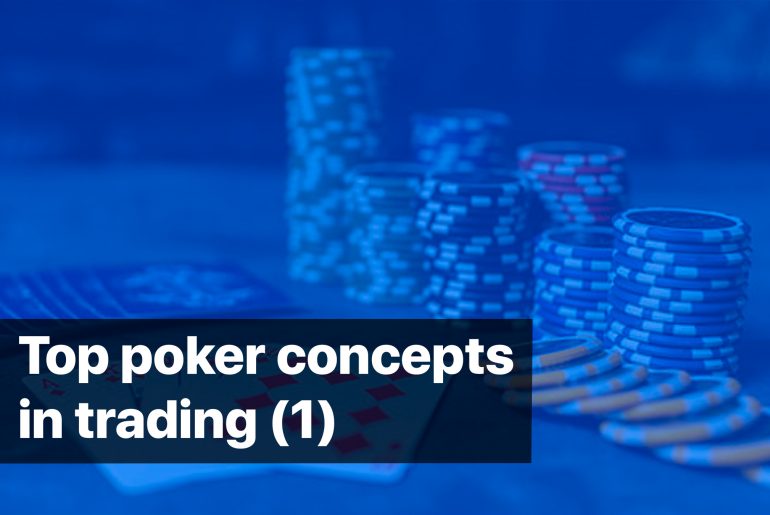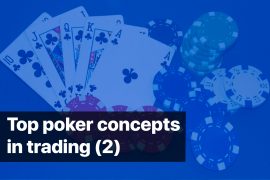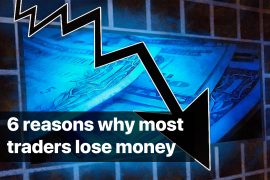Have you ever admired at least in movies how the poker players act? In cold blood, rationally and with no hesitations. Like it helps in poker, similarly, it does in investing and trading. Wanna be the same in trading? Then learn some rules from successful poker players and apply them in trading! The idea is that some poker experience may help you to reveal your emotional traps, which destroy your strategy and, therefore, your investing and trading results. Thus, both gambling and trading require you to keep strictly in control of your emotions. So, it’s all about psychology!
Actually, there is a consensus among investors and poker players on emotional stability as a key to success (sometimes it’s even recommended not to trade while you are emotionally unstable). But to control the emotional state you’d better know what exactly to pay attention to. Here are three common mistakes committed by poker players that are typical of investors and traders as well: greed, overconfidence, and regrets (note that these rules work only with the general risk management strategy and knowledge of your trading stats!).
Greed makes you blind
Greed is one of the strongest emotions when we deal with money, specifically a rapid increase in the gains. Some may deny, but it is laid down in our brain. Getting a lot, we want more and more. Thinking of greater sums, we concentrate on what we will feel if we get the sums desired. Bad move. The pleasure is so sweet and strong that we often ignore the important facts that indicate our growing risk to lose, and we even do not want to accept that it is time to pull the profit.
To illustrate, you’ve got aces as a starting point. It is a great potential and opportunity to win. On the other hand, it may bring a lot of losses. Why does it happen? Simply, as our mind is blurred by greed, we are focused on the result but not on how to achieve it. In a matter of minutes, we can become a sort of narrow-minded, unfortunately. We neglect an unpleasant fact that someone probably already has covered the aces by three cards of hearts suit. So, you with all your might skip a possible danger of flash.

The same happens with investment and trading. You picked a perfect project with such a promising future and reputation. And you, beckoned by golden opportunity, buy as many coins as possible. Then some negative news is appearing, for instance, about some fraud conducted by the team of this project. However, you try to isolate yourself from it just like there was no such news. As a result, you keep losing.
Therefore, to be a winner, it’s worth isolating yourself not from possible reasons for the problems, but from greed. Thus, concentrate on the present, not the future. It means to think about the ways you may lose and to protect yourself from it. To accept your mistakes and be able to adjust your strategy timely. It means to review your trading statistics and audit your risks to stay aware of your trading performance (read how it works for hedge funds).
In other words, to do the best now so as to enjoy the profits later.
Overconfidence makes you undisciplined
People by their very nature often consider themselves to be better than average in many things…They suppose they are good at Math, perfect cookies, and have a brilliant sense of humor. At the same time, it is a well-known fact that in many cases more than half of the people are worse than average.
In poker, the feeling of being better than others is triggered by an array of the wins, when people start to realise their outstanding superiority and fortune. They start to act riskier, in many cases unduly, turning the opportunities into losses.
This overconfidence may cause even mania, when you cannot stop, although knowing then it’s already a time to get out of the game. A good example is financial bubbles, when people realised that they are able to make a fortune on sharply growing shares, but the confidence was undermined after the boom happened. The people could have gotten out of it with profits, but the barrier here was confidence and greed.
Crypto market is the same! It’s disrupting and dangerous at the same time. Thus, you can make a fortune and at the same time lose everything you have. The choice is yours. Therefore, it’s recommended to develop a set of rules you should comply with, be it trading, investing, poker playing.
The idea for tackling the problem of overconfidence is to always check if you are getting sidetracked from your trading plan, as Vanessa Rousso, a famous American poker player, says.
Regrets make you silly
We all regret losing. However, some of us control the regrets, while others are driven by this emotion, feeling destroyed and trying best to recover losses by any means. In poker, it is called “tilt”. Thus, after suffering several in a row of losses, people often start doing crazy things to win the lost money back. However, they are already influenced by negative feelings (that their money now belongs to someone else) and may act extremely irrational.
Bad beats often lead to two scenarios: they either play too bravely, having not really strong combinations, or act too fearfully and conservatively, being afraid to get hurt one more time.
Interesting fact: the same part of the brain is activated if we both are hurt physically or suffer financial losses. Therefore, the reaction is similar.
The same happens in investing and trading. After a significant loss, you feel regrets that you made a mistake. Thus, you start widening your stops or overholding losing positions that brings you more and more losses.
Then, why does this feeling make you so messed up? The answer is that people generally hate to bear responsibility for their pain and losses. Like in childhood, they want to blame anyone and anything, except themselves. It’s easier than to accept that you are wrong and start acting in a systemic way.
Therefore, for those who suffer from tilt, it is recommended to calm down, first of all (we mean stop trading), and break your mistakes down. Yes, you’ve lost, but on the flip side, it’s a valuable opportunity to get knowledge and adjust your strategy.
Simply, use the Forrest Gump approach “Shit happens” and move on!
That’s why any professional trader records trading statistics that reveals the mistakes and rooms for improvement. This way, traders can adequately assess their trading strategy, revealing weak points easily with minimum emotions involved. Furthermore, a lot of them set limits on losses to stop trades after a row of losses. In this case, you can either comply with rules on your own, or use automated systems that control your emotions.
If you are aimed at constant earning, you definitely need to manage your emotions and timely cut losses. This way, you are more likely to become that 5% of high achievers in the market (read some more rules applied by successful traders here).
Read about other mistakes typical for poker, trading, and investing in our further article.
Stay tuned and join our social media:
Telegram: https://t.me/bitinsurecom
Facebook: https://www.facebook.com/bitinsure
Twitter: https://twitter.com/bitinsure_news





